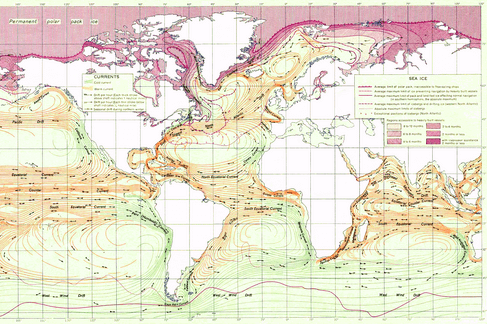
A recent study has unveiled alarming findings about the state of the Atlantic Ocean’s circulation, signalling a potential tipping point with dire consequences for both the climate system and humanity.
Researchers, taken aback by the forecasted rapidity of collapse, developed an early warning system to track the breakdown of the Atlantic meridional overturning circulation (Amoc), a vital component of global climate regulation.
This vast system of ocean currents, including segments of the Gulf Stream, transports heat, carbon, and nutrients from the tropics to the Arctic Circle, where it cools and sinks into the deep ocean. However, mounting freshwater influx from Greenland’s melting glaciers and Arctic ice sheets obstructs the sinking of warmer, saltier water from the south, undermining Amoc’s stability.
Studies indicate that Amoc has already weakened by 15% since 1950, reaching its feeblest state in over a millennium. Previous research hinted at an impending collapse, but uncertainties loomed over its severity and timeline. While some projections suggested a tipping point between 2025 and 2095, others deemed large, rapid changes in Amoc as improbable in the 21st century.
The latest study, published in Science Advances, revolutionises understanding by identifying warning signs in the Atlantic’s southern salinity levels, between Cape Town and Buenos Aires. Simulating climate changes over 2,000 years, researchers discovered that a gradual decline could precipitate a sudden collapse in less than a century, with catastrophic ramifications.
“This is bad news for the climate system and humanity as up till now one could think that Amoc tipping was only a theoretical concept and tipping would disappear as soon as the full climate system, with all its additional feedbacks, was considered.”
Consequences of Amoc collapse loom large: sea levels could surge by a meter in certain regions, submerging coastal cities; the Amazon’s wet and dry seasons might invert, pushing the rainforest towards irreparable damage; global temperatures would fluctuate unpredictably; and the southern hemisphere would experience heightened warmth while Europe cools dramatically with reduced rainfall.
Though this cooling might seem like relief from current warming trends, the abruptness of changes, ten times faster than present, would render adaptation nearly impossible.
“What surprised us was the rate at which tipping occurs,” said the paper’s lead author, René van Westen, of Utrecht University. “It will be devastating.”
He stressed the irreversible nature of these changes on human timescales, although precise timing remains uncertain.
While the exact timeframe of Amoc’s collapse remains elusive, the trajectory is undeniably concerning. As Amoc edges towards a critical juncture, the urgency to address its destabilisation grows ever more imperative.
“We are moving towards it. That is kind of scary,” van Westen said. “We need to take climate change much more seriously.”
——————————————————————————
At Natural World Fund, we are passionate about stopping the decline in our wildlife.
The decline in our wildlife is shocking and frightening. Without much more support, many of the animals we know and love will continue in their decline towards extinction.
When you help to restore a patch of degraded land through rewilding to forests, meadows, or wetlands, you have a massive impact on the biodiversity at a local level. You give animals a home and food that they otherwise would not have had, and it has a positive snowball effect on the food chain.
We are convinced that this is much better for the UK than growing lots of fast-growing coniferous trees, solely to remove carbon, that don’t actually help our animals to thrive.
This is why we stand for restoring nature in the UK through responsible rewilding. For us, it is the right thing to do. Let’s do what’s right for nature!
Donate today at https://naturalworldfund.com/ and join in the solution!

